- Home
- Ernest Hemingway
By-Line Ernest Hemingway Page 28
By-Line Ernest Hemingway Read online
Page 28
At this moment, a shell has just alighted on a house up the street from the hotel where I am typing this. A little boy is crying in the street. A militiaman has picked him up and is comforting him. There was no one killed on our street, and the people who started to run slow down and grin nervously. The one who never started to run at all looks at the others in a very superior way, and the town we are living in now is called Madrid.
The Fall of Teruel
NANA Dispatch • DECEMBER 23, 1937
TERUEL FRONT.—We lay on top of a ridge with a line of Spanish infantry under heavy machine gun and rifle fire. It was so heavy that if you had lifted your head out of the gravel you would have dug your chin into one of the little unseen things that made the stream of kissing, whisper sounds that flowed over you after the pop-pop-pop of the machine guns on the next ridge beyond would have lifted the top of your head off. You knew this because you had seen it happen.
On our left, an attack was starting. The men, bent double, their bayonets fixed, were advancing in the awkward first gallop that steadies into the heavy climb of an uphill assault. Two men were hit and left the line. One had the surprised look of a man first wounded who does not realize the thing can do this damage and not hurt. The others knew he had it very bad. All I wanted was a spade to make a little mound to get my head under. But there weren’t any spades within crawling distance.
On our right was the great yellow mass of the Mansueto, the natural battleship-shaped fortress that defends Teruel. Behind us the Spanish government artillery were firing, and, after the crack, came the noise like tearing silk and then the sudden spouting black geysers of high explosive shells pounding at the earth-scarred fortifications of Mansueto.
We had come down through the pass on the Sagunto road to within nine kilometers of Teruel and had left our car. Then we walked along the road to kilometer six and there was the front line. We had stayed there a little while, but it was in a hollow and you couldn’t see well. We climbed a ridge to see and were machine-gunned. Below us an officer was killed and they brought him back slowly, heavily and laid him gray-faced on a stretcher. When they bring the dead back on stretchers, the attack has not yet started.
The amount of fire we were drawing being incommensurate with the view, we broke for the ridge where the advanced positions of the center were. In a little while it was not a nice place to be either, although the view was splendid. The soldier I was lying next to was having trouble with his rifle. It jammed after every shot and I showed him how to knock the bolt open with a rock. Then suddenly we heard cheering run along the line and across the next ridge we could see the Fascists running from their first line.
They ran in the leaping, plunging gait that is not panic but a retreat, and to cover that retreat their further machine gun posts slithered our ridge with fire. I wished very strongly for the space, and then up the ridge we saw government troops advancing steadily. It went on like that all day and by nighttime we were six kilometers beyond where the first attack had started.
During the day we watched government troops scale the heights of Mansueto. We saw the armored cars go with troops to attack a fortified farmhouse a hundred yards from us, the cars lying alongside the house and whang, whang, whanging into the windows while the infantry ducked into it with hand grenades. We lay during this in the doubtful lee of a grass-stuffed hummock and the Fascists threw eighty-millimeter trench mortars behind us on the road and in the field, they coming with a sudden whushing drop and cracking burst. One landed in the wave of an attack and one man ran out of the seeming center of the smoke in a half-circle, first naturally, wildly back, then checked and went forward to catch up with the line. Another lay where the smoke was settling.
No smoke blew that day. After the Arctic cold, the blizzard and the gale that blew for five days, this was Indian summer weather and shell bursts flowered straight up and slowly sank. And all day long the troops attacked, held, attacked again. As we had come along the road, the troops waiting in the ditch, mistaking us for high staff officers because there is nothing so distinguished as civilian clothes at the front, would shout, “Look at them up there on the hill. When do we attack? Tell us when we can go.”
We sat behind trees, comfortable thick trees, and saw twigs clipped from their drooping lower branches. We watched the Fascist planes head for us and hunted shelter in a soil-eroded gulch only to watch them turn and circle to bomb the government lines near Concud. But all day long we moved forward with the steady merciless advance the government troops were making. Up the hillsides, across the railway, capturing the tunnel, all up and over the Mansueto, down the road around the bend from kilometer two and finally up the last slopes to the town, whose seven church steeples and neatly geometrical houses showed sharp against the setting sun.
The late evening sky had been full of government planes, the chasers seeming to turn and dart like swallows, and, while we watched their delicate precision through our glasses, hoping to see an air fight, two trucks came noising up and stopped, dropping their tailboards to discharge a company of kids who acted as though they were going to a football game. It was only when you saw their belts with sixteen bomb pouches and the two sacks each wore that you realized what they were, “dynamiters.”
The captain said, “These are very good. You watch when they attack the town.” So, in the short afterglow of the setting sun, with all around the town the flashing of the guns, yellower than trolley sparks but as sudden, we saw these kids deploy a hundred yards from us, and, covered by a curtain of machine gun and automatic rifle fire, slip quietly up the last slope to the town’s edge. They hesitated a moment behind a wall, then came the red and black flash and roar of the bombs, and over the wall and into the town they went.
“How would it be to follow them into the town?” I asked the colonel. “Excellent,” he said, “a marvelous project.” We started down the road, but now it was getting dark. Two officers came up, checking on scattered units, and we told them we would stay with them because, in the dark, people might shoot hastily and the countersign had not yet arrived. In the pleasant autumn falling dusk, we walked the road downhill and into Teruel. It was a peaceful feeling night and all the noises seemed incongruous.
Then in the road was a dead officer who had led a company in the final assault. The company had gone on and this was the phase where the dead did not rate stretchers, so we lifted him, still limp and warm, to the side of the road and left him with his serious waxen face where tanks would not bother him now nor anything else and went on into town.
In town, the population all embraced us, gave us wine, asked us if we didn’t know their brother, uncle or cousin in Barcelona, and it was all very fine. We had never received the surrender of a town before and we were the only civilians in the place. I wonder who they thought we were. Tom Delmer, London newspaper correspondent, looks like a bishop, Herbert L. Matthews, of the New York Times, like Savonarola, and I like, say, Wallace Beery three years back, so they must have thought the new regime would be, say, complicated.
But they said we were what they had been waiting for. They said they had stayed in the cellars and caves when the offer from the government came to evacuate because the Fascists would not let them leave. Also they said the government did not bomb the town, only military objectives. They said this, not me.
After reading in papers just received in Madrid from New York, still in the car, about General Franco giving the government five days to surrender before starting the final triumphal offensive, it seemed just a little incongruous that we should be walking into Teruel, that great rebel strongpoint from which they were to drive to the sea.
The Flight of Refugees
NANA Dispatch • APRIL 3, 1938
BARCELONA.—It was a lovely false spring day when we started for the front this morning. Last night, coming in to Barcelona, it had been gray, foggy, dirty and sad, but today it was bright and warm, and pink almond blossoms colored the gray hills and brightened the dusty green rows of olive
trees.
Then, outside of Reus, on a straight smooth highway with olive orchards on each side, the chauffeur from the rumble seat shouted, “Planes, planes!” and, rubber screeching, we stopped the car under a tree.
“They’re right over us,” the chauffeur said, and, as this correspondent dove head-forward into a ditch, he looked up sideways, watching a monoplane come down and wing over and then evidently decide a single car was not worth turning his eight machine guns loose on.
But, as we watched, came a sudden egg-dropping explosion of bombs, and, ahead, Reus, silhouetted against hills a half mile away, disappeared in a brick-dust-colored cloud of smoke. We made our way through the town, the main street blocked by broken houses and a smashed water main, and, stopping, tried to get a policeman to shoot a wounded horse, but the owner thought it was still possibly worth saving and we went on up toward the mountain pass that leads to the little Catalan city of Falset.
That was how the day started, but no one yet alive can say how it will end. For soon we began passing carts loaded with refugees. An old woman was driving one, crying and sobbing while she swung a whip. She was the only woman I saw crying all day. There were eight children following another cart and one little boy pushed on a wheel as they came up a difficult grade. Bedding, sewing machines, blankets, cooking utensils and mattresses wrapped in mats, sacks of grain for the horses and mules were piled in the carts and goats and sheep were tethered to the tailboards. There was no panic, they were just plodding along.
On a mule piled high with bedding rode a woman holding a still freshly red-faced baby that could not have been two days old. The mother’s head swung steadily up and down with the motion of the beast she rode, and the baby’s jet-black hair was drifted gray with the dust. A man led the mule forward, looking back over his shoulder and then looking forward at the road.
“When was the baby born?” I asked him, as our car swung alongside. “Yesterday,” he said proudly, and the car was past. But all these people, no matter where else they looked as they walked or rode, all looked up to watch the sky.
Then we began to see soldiers straggling along. Some carried their rifles by the muzzles, some had no arms. At first there were only a few troops, then finally there was a steady stream, with whole units intact. Then there were troops in trucks, troops marching, trucks with guns, with tanks, with anti-tank guns and anti-aircraft guns, and always a line of people walking.
As we went on, the road choked and swelled with this migration, until, finally, it was not just the road, but streaming alongside the road by all the old paths for driving cattle came the civilian population and the troops. There was no panic at all, only a steady movement, and many of the people seemed cheerful. But perhaps it was the day. The day was so lovely that it seemed ridiculous that anyone should ever die.
Then we began seeing people that we knew, officers you had met before, soldiers from New York and Chicago who told how the enemy had broken through and taken Gandesa, that the Americans were fighting and holding the bridge at Mora across the Ebro River and that they were covering this retreat and holding the bridgehead across the river and still holding the town.
Suddenly, the stream of troops thinned and then there was a big influx again, and the road was so choked that the car could not move ahead. You could see them shelling Mora on the river and hear the pounding thud of the guns. Then there came a flock of sheep to clog the road, with shepherds trying to drive them out of the way of the trucks and tanks. Still the planes did not come.
Somewhere ahead, the bridge was still being held, but it was impossible to go any further with the car against that moving dust-swamped tide. So we turned the car back toward Tarragona and Barcelona and rode through it all again. The woman with the new-born baby had it wrapped in a shawl and held tight against her now. You could not see the dusty head because she held it tight under the shawl as she swung with the walking gait of the mule. Her husband led the mule, but he looked at the road now and did not answer when he waved. People still looked up at the sky as they retreated. But they were very weary now. The planes had not yet come, but there was still time for them and they were overdue.
Bombing of Tortosa
NANA Dispatch • APRIL 15, 1938
TORTOSA, SPAIN.—Ahead of us, fifteen Heinkel light bombers, protected by Messerschmidt pursuit planes, swung ’round and ’round in a slow circle, like vultures waiting for an animal to die. Each time they passed over a certain point, there was the thud of bombs. As they swung over the bare hillside, keeping their steady formation, every third ship would dive, its guns spitting. They kept that up for forty-five minutes unmolested and what they were diving and bombing on was a company of infantry making a last stand on the hillside and bare ridge at noon on this hot spring day to defend the Barcelona-Valencia road.
Above us in the high cloudless sky, fleet after fleet of bombers roared over Tortosa. When they dropped the sudden thunder of their loads, the little city on the Ebro disappeared in a yellow mounting cloud of dust. The dust never settled, as more bombers came, and, finally, it hung like a yellow fog all down the Ebro valley. The big Savoia-Marchetti bombers shone white and silvery in the sun, and, as one group hammered over, another came.
Ahead of us all this time, the Heinkels were circling and diving with the mechanical monotony of movement of a quiet afternoon at a six-day bike race. And, under them, a company of men lay behind rocks in hastily dug fox holes and in simple folds of the ground, trying to hold up the advance of an army.
At midnight, the government communique admitted there was fighting around San Mateo and La Jana, which meant the last big defensive position, La Tancada, a steep rocky hill defending the road to the sea from Morella to Vinaroz, had been turned or taken.
At 4 o’clock in the morning, driving into a full moon that lighted the rocky Catalan hills, the jutting cypresses and weirdly chopped trunks of the plane trees, we headed for the front. By daylight, we passed the old Roman walls of Tarragona, and, by the time the sun was warming, we were meeting the first groups of refugees.
Later, we met troops who told of the break-through and that two columns were advancing on Vinaroz, a third on Ulldecona and a fourth from Lacenia toward La Galera in the direction of Santa Barbara, which is only thirteen kilometers from Tortosa. It was a four-fingered push toward the sea by General Aranda’s column of Navarrese troops and Moors, and officers reported it had already taken Calig and San Jorge, the last two towns on the two roads from San Mateo toward the sea.
At 1 o’clock this afternoon, the road was still open, but all signs pointed toward its being cut or brought under artillery fire by tonight or as soon as Aranda’s troops could bring up their guns. Meantime, from where this correspondent was talking in Ulldecona with a staff officer, his maps spread out on a stone wall, he could hear the firing of the machine guns.
The staff officer was talking coolly, carefully and with great politeness while Aranda’s troops were advancing past San Rafael, with only one ridge left between them and us. He was a very brave and competent soldier and was ordering up his armored cars, but our car wasn’t armored, so we decided to return past Santa Barbara. It was a nice little town, but it would have been better except that Tortosa was still spouting clouds of smoke as the bombers unloaded.
There were many reasons impelling us to get by Tortosa toward Barcelona, including life, liberty and the pursuit of happiness. So when the car arrived at Tortosa and a guard said the bombers had blown up the bridge and that we couldn’t go through, it was something that we had worried about for so long and so many times it made almost no impression except a feeling that “now it has really happened.”
“You can try the little bridge that they are fixing with some planks,” the guard said.
The chauffeur jumped the car forward, threaded through a line of trucks, past bomb holes into which two trucks could drop out of sight in the still freshly scorched earth and the acrid high explosive smell, and on to the little bridge. Ahead was a mule c
art.
“You can’t go there,” the guard shouted to the peasant leading the cart, heavily laden with grain, household goods, cooking pots, a jug of wine, and all the mule could haul with difficulty. But the mule had no reverse and the bridge was blocked. So your correspondent pushed on the wheels, the peasant hauled on the mule’s head and the cart rolled slowly forward, followed by the car, the narrow ironshod cart-wheels smashing the too-light new crossroads that kids were nailing down in a rush to get the frail bridge ready for traffic.
The boys were working, hammering, nailing and sawing as fast and hard as a good crew on a vessel in distress at sea. And, on our right, one section of the great iron bridge across the Ebro had slumped down into the stream and another gaped missing. The mass bombing of forty-eight bombers, using bombs, judging from the holes they made and the way they flung houses into rubble across the road, which must have been between 300 and 450 pounds apiece, had got the Tortosa bridge at last. In the town, a gasoline truck was burning. Driving through the street was like mountaineering in the craters of the moon. The railroad bridge still stands and a pontoon bridge undoubtedly will be built, but it is a bad night for the west bank of the Ebro.
Tortosa Calmly Awaits Assault
NANA Dispatch • APRIL 18, 1938
EBRO DELTA, SPAIN.—The irrigation ditch was full of this year’s crop of frogs. As you splashed forward, they scattered, jumping wildly. A line of boys lay behind a railroad track, each having dug himself a little shelter in the gravel below the rails, and their bayonets pointed above the shiny rails that would be rusty soon. On all their faces was the look of men—boys become men in one afternoon—who are awaiting combat.
Across the river, the enemy had just taken the bridgehead and the last troops had swum across the river after the pontoon bridge was blown up. Shells were coming in now from the little town of Amposta, across the river, and registering aimlessly in the open country and along the road. You’d hear the double boom of the guns, then the whirling cloth-ripping incoming rush and dirt would fountain brownly up among the grapevines.

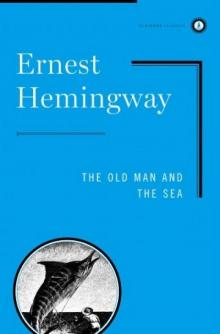 The Old Man and the Sea
The Old Man and the Sea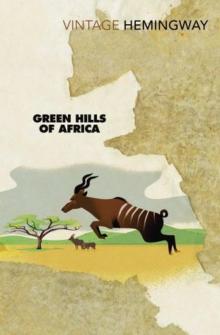 Green Hills of Africa
Green Hills of Africa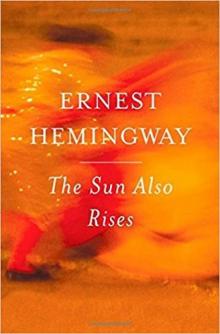 The Sun Also Rises
The Sun Also Rises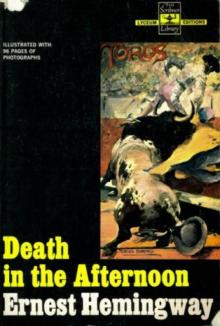 Death in the Afternoon
Death in the Afternoon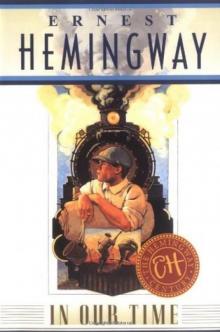 In Our Time
In Our Time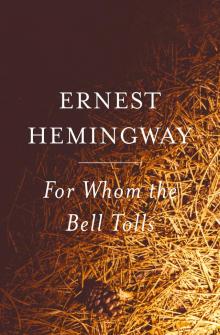 For Whom the Bell Tolls
For Whom the Bell Tolls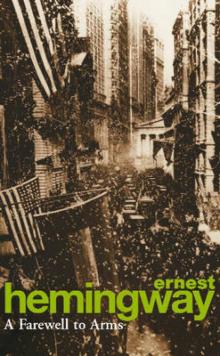 A Farewell to Arms
A Farewell to Arms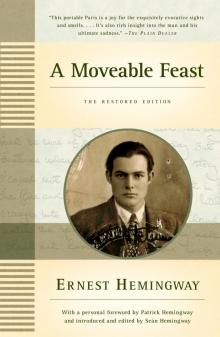 A Moveable Feast
A Moveable Feast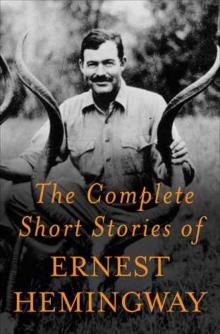 The Complete Short Stories of Ernest Hemingway
The Complete Short Stories of Ernest Hemingway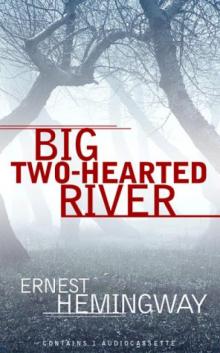 Big Two-Hearted River
Big Two-Hearted River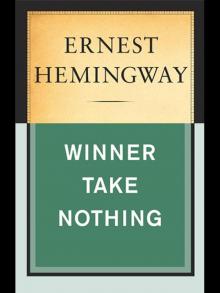 Winner Take Nothing
Winner Take Nothing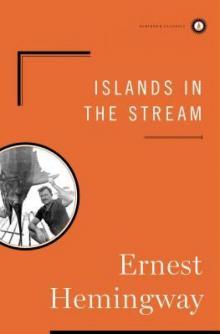 Islands in the Stream
Islands in the Stream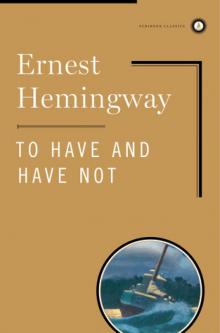 To Have and Have Not
To Have and Have Not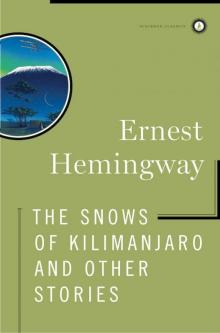 The Snows of Kilimanjaro and Other Stories
The Snows of Kilimanjaro and Other Stories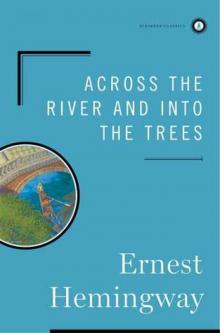 Across the River and Into the Trees
Across the River and Into the Trees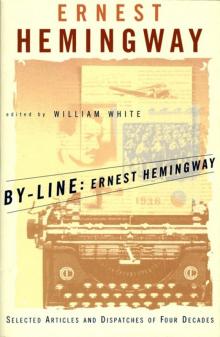 By-Line Ernest Hemingway
By-Line Ernest Hemingway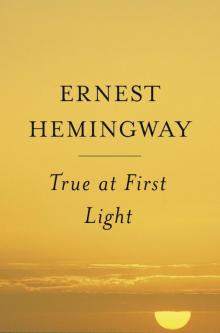 True at First Light
True at First Light Men Without Women
Men Without Women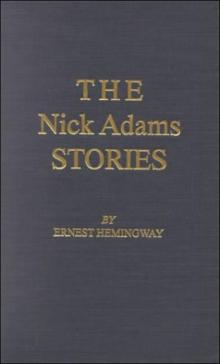 The Nick Adams Stories
The Nick Adams Stories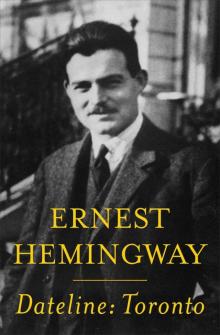 Dateline- Toronto
Dateline- Toronto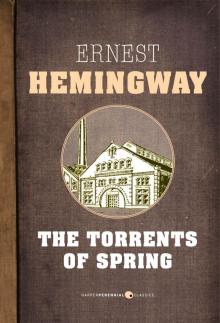 The Torrents of Spring
The Torrents of Spring Short Stories
Short Stories